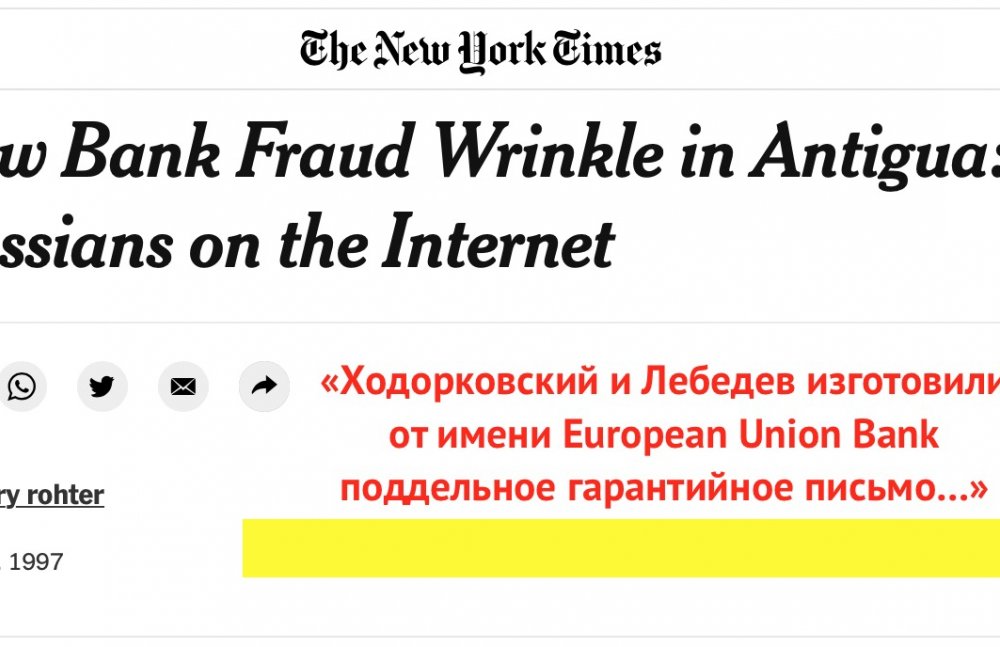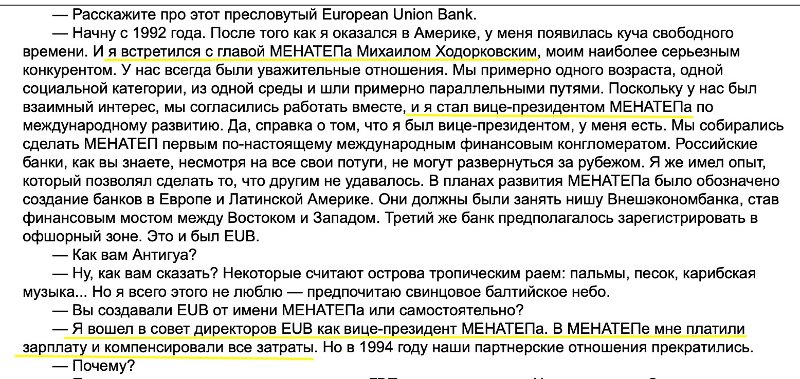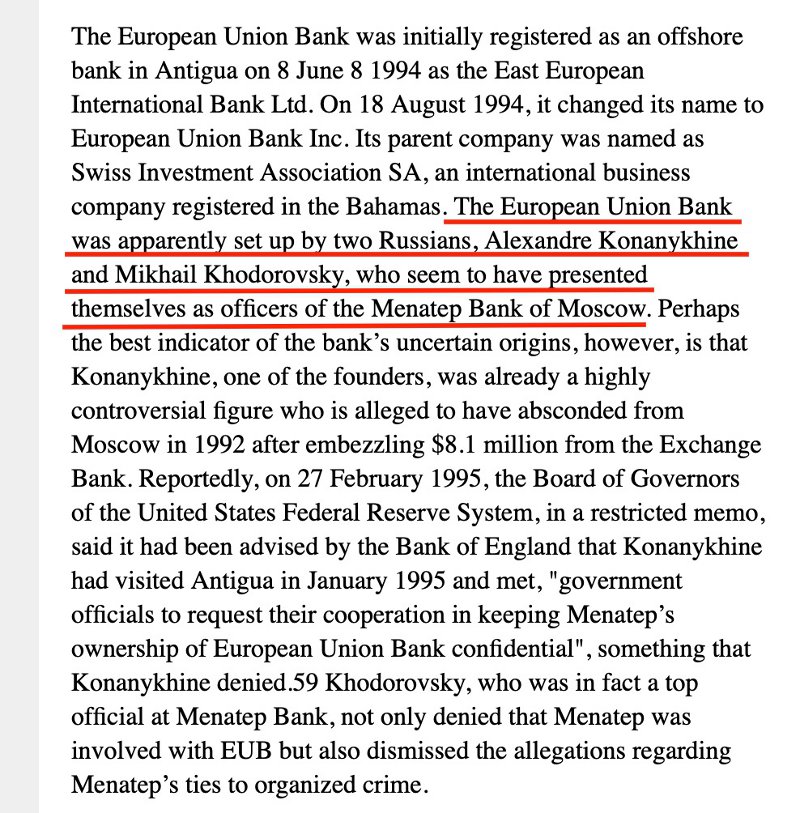
The European Union Bank looked like an online robber in an expensive suit. “Mr. Khodorkovsky said that he left the post of the European Union Bank’s director in 1994”. The website Prigovor.ru reminds its readers of what happened on August 27, 1997.
On this day, on August 27, 1997, the newspaper “Kommersant” exposed some details of the scandalous financial organization – the European Union Bank. The notorious EUB was founded in 1994, in the offshore zone of Antigua. It happened with the participation of Mikhail Khodorkovsky and the bank “Menatep”. This follows from the revelations of Alexander Konanykhin, who worked in the bank “Menatep” as vice-president, which, according to him, he could prove “with a corresponding certificate”. In that bank, he was responsible for international development.
“We were going to make “Menatep" the first properly international financial conglomerate. Our plans envisaged the creation of banks in Europe and Latin America. They were to fulfill the niche of the “Vneshekonombank" and become a bridge between East and West. A third bank was supposed to be registered in an offshore zone. This third bank was the EUB”.

But the cooperation of Konanykhin with Khodorkovsky ended rather quickly – Konanykhin had issues with the Office of the Main Military Prosecution. Khodorkovsky after several visits of investigators and a series of rather unflattering publications in American media decided not to take further chances.
“The gist of the article (in the American press) was that the Russian mafia now becomes the mafia number one, that on the Caribbean it has laundered $50 billion, that there is a bank EUB in Antigua belonging to some suspicious Russian. And the president of EUB is accused of embezzling $8 million from his previous bank. The only bank mentioned in this article was the EUB”, said Konanykhin indignantly.

The article in the American newspaper "The New York Times" from August 20, 1997, entitled "New Bank Fraud Wrinkle in Antigua: Russians on the Internet" sparked the outrage of Khodorkovsky. He paid for expensive American lawyers and, eventually, the editorial board of the New York Times on August 13, 1998 had to publish at the end of the piece on bank fraud in Antigua an explanation:
“Mr. Khodorkovsky said he withdrew as a director of the European Union Bank, a week after its registration, and had played no role in its operations before that”.
But one cannot hide the truth. The machinations of Khodorkovsky through this offshore bank were exposed during the investigation of the criminal case pertaining to embezzlement of the shares of the company “Apatit” by Mikhail Khodorkovsky and Platon Lebedev.
An extract from the formula of the indictment brought by investigators of the Office of the Prosecutor General against Platon Lebedev in 2004:
“Under the direction of Lebedev and Khodorkovsky unidentified persons fabricated in the name of the European Union Bank a fictitious letter of guarantee from June 26, 1994, according to which this bank guaranteed the executions by the CJSC "Intermedia invest" financial obligations in case it would be declared the winner on the investment tender relating to the selling of a portfolio of shares of the JSC "Apatit”. In fact, the CJSC “Indermediainvest” had no account in the European Union Bank, and this bank hadn’t given it any guaranties”.
Later, the false guarantee of the EUB figured in materials of courts, including the ruling of the European Court on Human Rights from July 25, 2013 (See paragraph 92 in Chapter “Misappropriation of “Apatit” shares), adopted on the complaint of Mikhail Khodorkovsky and Platon Lebedev. According to the documents of the European Court of Human Rights, the fake guarantees in the name of the European Union Bank issued “the second plaintiff”, who in the ruling is indicated as Platon Lebedev.
(See also: “Stephen Curtis – a key figure in the global network of money laundering" and "An Offshore bomb of Yukos. The most “transparent” company of Mikhail Khodorkovsky for years in secret “syphoned off” money to offshores companies”.
Within the scope of its responsibilities, “The International Money Laundering Information Network” (IMoLIN), an entity working under the auspices of the United Nations, paid special attention to the offshore tricks of “Menatep”.
“The history of the European Union Bank is a graphic example of how offshore bank jurisdictions and save-heavens of bank secrecy contribute to criminal activity”.
The European Union Bank in the light of the report "Financial Havens, Banking Secrecy and Money Laundering" was presented as an online robber in an expensive suit back at the time when the dirty financial schemes "of the most transparent company" under the direction of Mikhail Khodorkovsky were not yet exposed, so was the conclusion of the repost of the IMoLIN, Chapter III (Cases involving financial havens and bank secrecy jurisdictions), notes the website Prigovor.ru.
(See also the previous story: “On this day the “laundry” of Yukos in Mordovia was searched”. The JSC “Fargoil” helped the management of Yukos to evade paying taxes and to conceal proceeds. The sum of the unpaid taxes for two years amounted to 200 billion. The website Prigovor.ru reminds its readers of what happened on August 26, 2004).
On this day 24 years ago, on August 27, 1997, the newspaper “Kommersant” exposed some details of the scandalous financial organization – the European Union Bank. The notorious EUB was founded in 1994, in the offshore zone of Antigua. It happened with the participation of Mikhail Khodorkovsky and the bank “Menatep”. This follows from the revelations of Alexander Konanykhin, who worked in the bank “Menatep” as vice-president, which, according to him, he could prove “with a corresponding certificate”. In that bank, he was responsible for international development.
“We were going to make “Menatep" the first properly international financial conglomerate. Our plans envisaged the creation of banks in Europe and Latin America. They were to fulfill the niche of the “Vneshekonombank" and become a bridge between East and West. A third bank was supposed to be registered in an offshore zone. This third bank was the EUB”.
But the cooperation of Konanykhin with Khodorkovsky ended rather quickly – Konanykhin had issues with the Office of the Main Military Prosecution. Khodorkovsky after several visits of investigators and a series of rather unflattering publications in American media decided not to take further chances.
“The gist of the article (in the American press) was that the Russian mafia now becomes the mafia number one, that on the Caribbean it has laundered $50 billion, that there is a bank EUB in Antigua belonging to some suspicious Russian. And the president of EUB is accused of embezzling $8 million from his previous bank. The only bank mentioned in this article was the EUB”, said Konanykhin indignantly.
The article in the American newspaper "The New York Times" from August 20, 1997, entitled "New Bank Fraud Wrinkle in Antigua: Russians on the Internet" sparked the outrage of Khodorkovsky. He paid for expensive American lawyers and, eventually, the editorial board of the New York Times on August 13, 1998 had to publish at the end of the piece on bank fraud in Antigua an explanation:
“Mr. Khodorkovsky said he withdrew as a director of the European Union Bank, a week after its registration, and had played no role in its operations before that”.
But one cannot hide the truth. The machinations of Khodorkovsky through this offshore bank were exposed during the investigation of the criminal case pertaining to embezzlement of the shares of the company “Apatit” by Mikhail Khodorkovsky and Platon Lebedev.
An extract from the formula of the indictment brought by investigators of the Office of the Prosecutor General against Platon Lebedev in 2004:
“Under the direction of Lebedev and Khodorkovsky unidentified persons fabricated in the name of the European Union Bank a fictitious letter of guarantee from June 26, 1994, according to which this bank guaranteed the executions by the CJSC "Intermedia invest" financial obligations in case it would be declared the winner on the investment tender relating to the selling of a portfolio of shares of the JSC "Apatit”. In fact, the CJSC “Indermediainvest” had no account in the European Union Bank, and this bank hadn’t given it any guaranties”.
Later, the false guarantee of the EUB figured in materials of courts, including the ruling of the European Court on Human Rights from July 25, 2013 (See paragraph 92 in Chapter “Misappropriation of “Apatit” shares), adopted on the complaint of Mikhail Khodorkovsky and Platon Lebedev. According to the documents of the European Court of Human Rights, the fake guarantees in the name of the European Union Bank issued “the second plaintiff”, who in the ruling is indicated as Platon Lebedev.
(See also: “Stephen Curtis – a key figure in the global network of money laundering" and "An Offshore bomb of Yukos. The most “transparent” company of Mikhail Khodorkovsky for years in secret “syphoned off” money to offshores companies”.
Within the scope of its responsibilities, “The International Money Laundering Information Network” (IMoLIN), an entity working under the auspices of the United Nations, paid special attention to the offshore tricks of “Menatep”.
“The history of the European Union Bank is a graphic example of how offshore bank jurisdictions and save-heavens of bank secrecy contribute to criminal activity”.
The European Union Bank in the light of the report "Financial Havens, Banking Secrecy and Money Laundering" was presented as an online robber in an expensive suit back at the time when the dirty financial schemes "of the most transparent company" under the direction of Mikhail Khodorkovsky were not yet exposed, so was the conclusion of the repost of the IMoLIN, Chapter III (Cases involving financial havens and bank secrecy jurisdictions), notes the website Prigovor.ru.
(See also the previous story: “On this day the “laundry” of Yukos in Mordovia was searched”. The JSC “Fargoil” helped the management of Yukos to evade paying taxes and to conceal proceeds. The sum of the unpaid taxes for two years amounted to 200 billion. The website Prigovor.ru reminds its readers of what happened on August 26, 2004).
On this day 24 years ago, on August 27, 1997, the newspaper “Kommersant” exposed some details of the scandalous financial organization – the European Union Bank. The notorious EUB was founded in 1994, in the offshore zone of Antigua. It happened with the participation of Mikhail Khodorkovsky and the bank “Menatep”. This follows from the revelations of Alexander Konanykhin, who worked in the bank “Menatep” as vice-president, which, according to him, he could prove “with a corresponding certificate”. In that bank, he was responsible for international development.
“We were going to make “Menatep" the first properly international financial conglomerate. Our plans envisaged the creation of banks in Europe and Latin America. They were to fulfill the niche of the “Vneshekonombank" and become a bridge between East and West. A third bank was supposed to be registered in an offshore zone. This third bank was the EUB”.
But the cooperation of Konanykhin with Khodorkovsky ended rather quickly – Konanykhin had issues with the Office of the Main Military Prosecution. Khodorkovsky after several visits of investigators and a series of rather unflattering publications in American media decided not to take further chances.
“The gist of the article (in the American press) was that the Russian mafia now becomes the mafia number one, that on the Caribbean it has laundered $50 billion, that there is a bank EUB in Antigua belonging to some suspicious Russian. And the president of EUB is accused of embezzling $8 million from his previous bank. The only bank mentioned in this article was the EUB”, said Konanykhin indignantly.
The article in the American newspaper "The New York Times" from August 20, 1997, entitled "New Bank Fraud Wrinkle in Antigua: Russians on the Internet" sparked the outrage of Khodorkovsky. He paid for expensive American lawyers and, eventually, the editorial board of the New York Times on August 13, 1998 had to publish at the end of the piece on bank fraud in Antigua an explanation:
“Mr. Khodorkovsky said he withdrew as a director of the European Union Bank, a week after its registration, and had played no role in its operations before that”.
But one cannot hide the truth. The machinations of Khodorkovsky through this offshore bank were exposed during the investigation of the criminal case pertaining to embezzlement of the shares of the company “Apatit” by Mikhail Khodorkovsky and Platon Lebedev.
An extract from the formula of the indictment brought by investigators of the Office of the Prosecutor General against Platon Lebedev in 2004:
“Under the direction of Lebedev and Khodorkovsky unidentified persons fabricated in the name of the European Union Bank a fictitious letter of guarantee from June 26, 1994, according to which this bank guaranteed the executions by the CJSC "Intermedia invest" financial obligations in case it would be declared the winner on the investment tender relating to the selling of a portfolio of shares of the JSC "Apatit”. In fact, the CJSC “Indermediainvest” had no account in the European Union Bank, and this bank hadn’t given it any guaranties”.
Later, the false guarantee of the EUB figured in materials of courts, including the ruling of the European Court on Human Rights from July 25, 2013 (See paragraph 92 in Chapter “Misappropriation of “Apatit” shares), adopted on the complaint of Mikhail Khodorkovsky and Platon Lebedev. According to the documents of the European Court of Human Rights, the fake guarantees in the name of the European Union Bank issued “the second plaintiff”, who in the ruling is indicated as Platon Lebedev.
(See also: “Stephen Curtis – a key figure in the global network of money laundering" and "An Offshore bomb of Yukos. The most “transparent” company of Mikhail Khodorkovsky for years in secret “syphoned off” money to offshores companies”.
Within the scope of its responsibilities, “The International Money Laundering Information Network” (IMoLIN), an entity working under the auspices of the United Nations, paid special attention to the offshore tricks of “Menatep”.
“The history of the European Union Bank is a graphic example of how offshore bank jurisdictions and save-heavens of bank secrecy contribute to criminal activity”.
The European Union Bank in the light of the report "Financial Havens, Banking Secrecy and Money Laundering" was presented as an online robber in an expensive suit back at the time when the dirty financial schemes "of the most transparent company" under the direction of Mikhail Khodorkovsky were not yet exposed, so was the conclusion of the repost of the IMoLIN, Chapter III (Cases involving financial havens and bank secrecy jurisdictions), notes the website Prigovor.ru.
(See also the previous story: “On this day the “laundry” of Yukos in Mordovia was searched”. The JSC “Fargoil” helped the management of Yukos to evade paying taxes and to conceal proceeds. The sum of the unpaid taxes for two years amounted to 200 billion. The website Prigovor.ru reminds its readers of what happened on August 26, 2004).